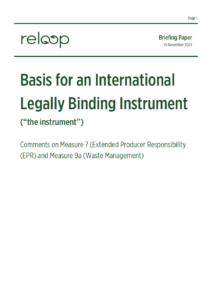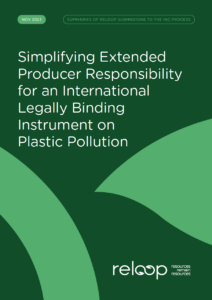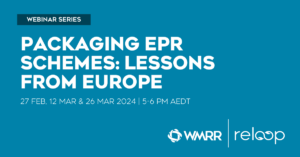UN Plastic Treaty Recommendation
Extended Producer Responsibility
The obligations for Parties to establish and regulate Extended Producer Responsibility (EPR) systems.
Reloop’s proposed text on Extended Producer Responsibility outlines obligations for Parties to establish and regulate national EPR systems.
Key provisions and objectives
- Establishment of EPR systems: Parties are required to establish one or more mandatory national EPR systems covering specified products, primarily focusing on those made of plastic. The modalities for these systems are detailed in Annex D, considering the specific products and circumstances of each Party.
- Cost coverage and recycling targets: EPR systems must ensure that producers cover a range of costs aimed at improving collection and recycling rates, as outlined in Annex D. Additionally, these systems should incentivise increased recyclability and product longevity to address littering issues.
- Transition to sustainable practices: Parties are encouraged to consider how their implementation of EPR measures contributes to a just transition, aligning with broader sustainability goals.
- Utilisation of fees: All fees collected from producers under EPR systems should be used solely for covering the costs of services intended to enhance recycling and waste management. Parties retain the right to impose separate taxes on plastic producers, as necessary, to achieve treaty objectives.
- National plan and performance monitoring: Parties must describe the measures introduced under the EPR system in their national plans and monitor their performance. Methodologies for monitoring are outlined in the treaty, ensuring consistency across Parties.
Annex D provides further details, including the scope of products covered by EPR, modalities for implementation tailored to product types, and suggested requirements and incentives for Parties to consider.
Overall, the proposed treaty aims to hold producers accountable for the life cycle management of their products, promoting sustainable practices, improving recycling rates, and mitigating the environmental impacts of plastic waste. By establishing clear obligations and guidelines, the treaty seeks to harmonize EPR efforts across Parties and advance global efforts towards waste reduction and circular economy principles.
UN Plastic Treaty text amendments
Reloop proposes changes to clause 7 Extended Producer Responsibility.
Get the latest on the UN plastic treaty
Reloop will be tracking the progress of the negotiations and sending out email updates.
More on EPR
-

Basis for an International Legally Binding Instrument
Briefing paper commenting on Measure 7 Extended Producer Responsibility (EPR) and Measure 9a (Waste Management).
-

Simplifying Extended Producer Responsibility for an International Legally Binding Instrument on Plastic Pollution
Summary of recommendations to simplify extended producer responsibility to deliver on the legally binding instrument’s objective.
-

Reloop discusses EPR in the context of the International Legally Binding Instrument’s Zero Draft
9 minute video discussing the concept of extended producer responsibility (EPR).
-

Webinar Series: Packaging EPR Schemes: Lessons from Europe (Romania and Poland)
Webinar on approaches adopted by Romania and Poland in meeting EU requirements, including EPR scheme responsibilities and governance.
-

Webinar Series: Packaging EPR Schemes: Lessons from Europe (Sweden)
Webinar offering invaluable insights into Sweden’s pioneering Extended Producer Responsibility scheme.
-

Packaging EPR Schemes: Lessons from Europe – Webinar 3 (France)
Webinar discussing developments in managing packaging in Europe, and what we can learn from them in the lead up to public consultation on packaging reforms in Australia.